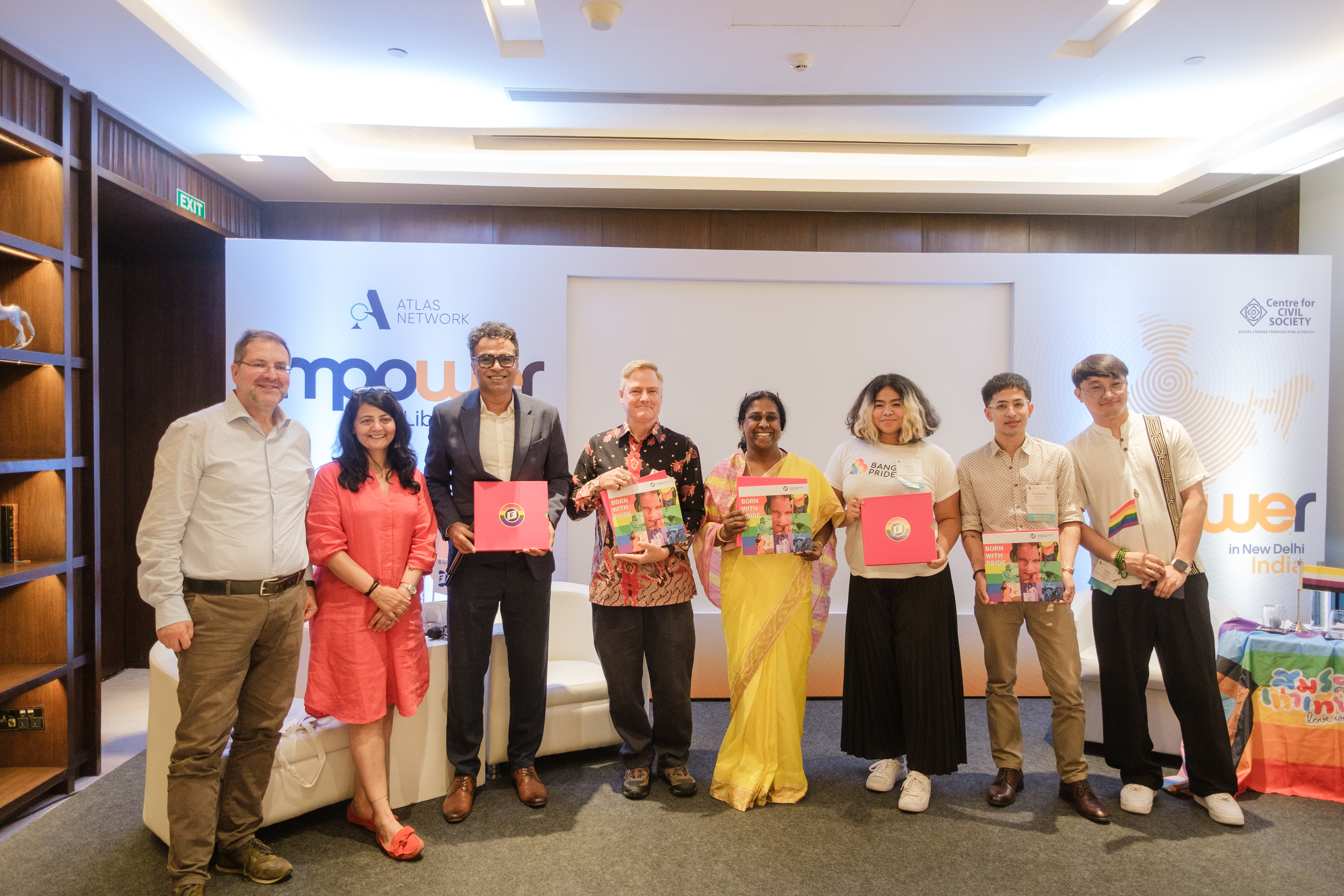Asia Liberty Forum 2024
Policy Pathways for Gender and Sexual Minorities in Asia: Reflections on Freedom and Dignity

"India crossed an important milestone with the legal recognition of transgender individuals. However, there is still a need for greater political representation, better access to education and healthcare, and better protection of family rights for transgender individuals in the years to come," said Akkai Padmashali, a transgender activist and panelist at the Asia Liberty Forum 2024. The event, held in New Delhi on September 21, 2024, was organized by the Atlas Network, a nonprofit organization promoting individual liberty and free markets, in collaboration with the Friedrich Naumann Foundation (FNF) in South Asia.
The panel, a part of the Asia Liberty Forum 2024, featured Premnath C. Dolawatte, Attorney at Law and Member of Parliament from Sri Lanka (joining virtually); Akkai Padmashali, a transgender activist and member of the Indian National Congress; Plaifah Kyoka Shodladd, a member of Thailand's Parliamentary Committee on Same-Sex Marriages; and Parakram Rana, a digital content creator from Nepal. Moderated by Ruhaan Joshi, the panel discussed progress in LGBTQIA+ rights across these countries, highlighting the ongoing challenges in securing rights and dignity for gender and sexual minorities in Asia.
Member of the European Parliament, Mr. Michael Kauch of the Free Democratic Party, Germany, shared a video address, emphasizing the importance of advancing human dignity, democracy, and LGBTQIA+ rights.
In his opening remarks, Mr. Frank Hoffman, Regional Manager for FNF South Asia, stressed the significance of regional cooperation in promoting LGBTQIA+ rights. The event concluded with remarks from Dr. Tom Palmer, Executive Vice President at the Atlas Network, USA.
Advancements and Setbacks in LGBTQIA+ Rights across Asia
India’s 2018 Supreme Court ruling decriminalizing homosexuality marked a major legal shift in LGBTQIA+ rights in one of the largest South Asian countries. Nepal's Supreme Court has recognized same-sex marriages, making it one of the few countries in Asia, alongside Thailand and Taiwan, to do so. However, progress remains limited in countries like Pakistan and Bangladesh, where LGBTQIA+ communities face significant legal and social barriers.
Premnath C. Dolawatte, one of the few policymakers championing LGBTQIA+ rights in Asia, is working to repeal Sri Lanka’s penal code to decriminalize homosexuality through parliamentary consensus. Dolawatte emphasized the importance of incremental reforms in conservative societies. "As a practicing Buddhist, I believe tolerance and acceptance of all people, including those different from us, is essential. LGBTQIA+ rights are human rights, and change—whether in legal recognition, decriminalization, or social acceptance—must come one step at a time," he said during his virtual address.
Kyoka Shodladd, a 19-year-old activist from Thailand, highlighted the recent passing of the Marriage Equality Bill in Thailand. "This victory belongs to everyone—activists, LGBTQIA+ individuals, and parliamentarians—who worked to make marriage equality a reality in Thailand," they said, emphasizing the collaborative nature of the fight for equality.
Ongoing Challenges
Asia has made remarkable progress over the last few years in recognizing LGBTQIA+ rights, however, the progress is not equal and challenges of social stigma, criminalisation, and lack of legal recognition persist across the region. The panelists shared some of their experiences in countries such as Nepal, India, and Thailand, with the challenges that the gender and sexual minorities face in Asia.
“At a recent public forum, I had the chance to ask a question to the Prime Minister of Nepal, who openly admitted his lack of awareness about LGBTQIA+ rights, to a loud cheer from the young audience," shared Parakram Rana, a digital content creator from Nepal. "This highlights both the negative public opinion and the limited political will to support LGBTQIA+ rights, despite favorable rulings by the Supreme Court."
Akkai Padmashali, a transgender activist from India, noted that legal recognition alone has not sufficiently improved the socio-economic conditions of transgender individuals in India. She underscored the critical need for greater political representation of transgender individuals. She also emphasized the importance of securing family rights for transgender individuals.
The Path Forward
The panelists agreed that while progress in advancing LGBTQIA+ rights across Asia has been made in advancing LGBTQIA+ rights across Asia, significant challenges remain. Countries like Pakistan, Bangladesh, Afghanistan, and the Maldives continue to enforce significant legal and social restrictions on LGBTQIA+ communities. Slow progress in Sri Lanka and Bhutan, remains an area of concern where despite political awareness of LGBTQIA+ issues, reforms have been limited.
The discussion also highlighted the threats posed by rising populism and the lack of regional cooperation. Panelists emphasized the need for greater international collaboration to address these challenges, calling for more research, support for policy reforms, and sustained advocacy to drive meaningful change for LGBTQIA+ communities across Asia.
Underscoring the importance of recognizing progress in the fight for LGBTQIA+ rights, Dr. Tom Palmer from the Atlas Network encouraged participants to celebrate victories achieved. Palmer cited examples from the U.S., where milestones such as the decriminalization of same-sex relations and anti-discrimination policies in public employment have marked key successes. He stressed that liberty is for everyone, advocating for legal equality while allowing space for differing beliefs within a framework of tolerance and freedom of expression. Event moderator Ruhaan Joshi emphasized the connection between economic and individual freedom, noting that progress in one often drives progress in the other.
The panel attracted a large number of young researchers and policy practitioners from various think tanks across the globe. Many participants acknowledged that while the focus was on LGBTQIA+ rights, the challenges discussed mirrored those faced in other areas of policy reform. The event concluded with Mr. Georg Prick, Head of State Parliament, Saxony, Germany, felicitating the panelists for their contributions to advancing LGBTQIA+ rights in the region.
